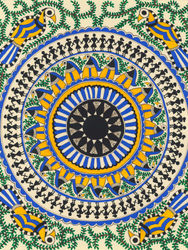Art by Lalima Srivastava
Fusion Folk Paintings
The fusion painting is created by fusing two folk arts- Madhubani and Warli. The paintings are created around symbolic motifs from Madhubani art such as the Sun, fish, trees, and snake, with scenes of daily life and the elements of nature from Warli art. The uniqueness is to create compositions balancing the two styles.
Tree Series
Trees are sacred in India. They have been worshiped since time immemorial as gratitude. It is believed that life cannot exist without trees. Many trees are associated with a god or a goddess. In both the folk arts-Madhubani and Warli, the tree of life painting is a common theme. Artists are inspired by different trees around them, for example, in Warli art, the Banyan tree is commonly portrayed. In Madhubani style, more ornamental trees such as Kadamb or Palash are used. The paintings here are more focused on various styles of Madhubani art, along with various elements of nature, such as birds, fish, and animals.
Fish Series
Fish is a very common theme in Madhubani style. According to Mithila artist’s fish is the symbol of good luck and holiness. Fish also symbolize water with which it is associated. According to Hindu mythology, fish is also one of the many avatars of Lord Vishnu. Tradition of fishing is an integral part of rural Warli culture and has been depicted by various artists. Fishing is not just a means of sustenance but is considered as a spiritual act.
Bird and Snake Series
Both snakes and birds are common themes in the folk arts. In Hindu mythology, snakes are both feared and revered. They are worshiped in temples and their natural habitats, offering them milk, incense, and prayers. In both Warli and Madhubani art forms, the emergence of snakes is not only celebrated but also regarded as auspicious. While the birds are painted decoratively, without any realistic touch in Madhubani art, they are simple silhouettes in Warli.
Sun Series
The Sun is the soul and the source of all life. It is constantly spreading light to ensure Earth remains habitable and the atmosphere of the celestial sphere (sky) is maintained. During my research, I also learned that the rising Sun is Surya, depicted by a masculine version, whereas at sunset it is Savitri, the feminine version. The paintings are around both versions, exploring their relationship with humans and nature











































